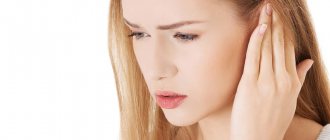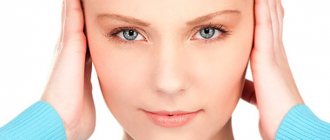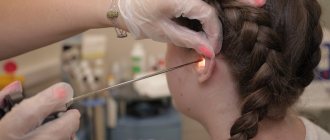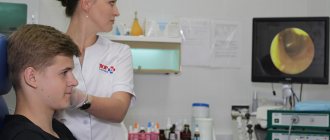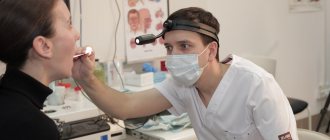Updated: 04/23/2021 15:29:36
Expert: Pogrebnoy Stanislav Leonidovich
*Review of the best according to the editors of expertology.ru. About the selection criteria. This material is subjective in nature, does not constitute advertising and does not serve as a purchase guide. Before purchasing, consultation with a specialist is required.
Tinnitus, or tinnitus, is a condition that can significantly impair quality of life, although the person does not experience any pain and can walk normally. But his whole life, and especially in silence, sometimes passes under the influence of almost constant noise, and this is very painful. It is estimated that almost 40% of people sometimes experience tinnitus, 8% call it constant, and every hundred people almost constantly suffer from debilitating noise that disturbs not only at night, but also during the day.
This problem has been most studied in the USA, and there 2 million patients with tinnitus are disabled, and 18 million patients are being treated for tinnitus of varying severity. It is surprising that completely deaf patients, who were born deaf, never complain of noise. It is also interesting that based on complaints about noise, it is impossible to make an accurate diagnosis of any disease (it is not a pathognomonic symptom). It is clear that the vast majority of patients with noise also have some degree of hearing loss.
How to determine tinnitus? This is a condition in which sound is felt in the ears or head, but there is no external acoustic influence. What is this unpleasant, disturbing feeling like?
Tinnitus: causes and treatment.
Saturday, October 30
5309
4.5
1
Content
- Types of tinnitus
- Causes of tinnitus
- How to treat tinnitus
- Vinpocetine
- Aminazine
- Tanakan
- Preductal MR
- Cinnarizine
- Master Hearing
- Betagistine
- Atheroclephitis BIO
- Vasobral
- Bilobil Intense 120
Tinnitus (tinnitus) is a condition that does not cause the slightest pain, but can significantly impair the quality of life. A person constantly (especially in silence) hears noise, which is very painful. According to statistics, about 40% of people experience tinnitus from time to time. In the United States, for example, approximately 18 million people face this problem. Interestingly, patients who are deaf from birth never complain of tinnitus.
The best drugs for tinnitus
| Nomination | place | Name of product | price |
| MEANS THAT NORMALIZE BLOOD CIRCULATION AND METABOLISM | 1 | Vinpocetine (Cavinton, Telektol) | 103 ₽ |
| 2 | Ginkgo biloba (Tanakan, Bilobil, Ginkum, Memoplant) | 568 ₽ | |
| 3 | Cinnarizine (Stugeron, Vertizin) | 35 ₽ | |
| 4 | Trimetazidine (Preductal MV, Angiozil, Deprenorm, Rimekor, Trimectal) | 70 ₽ | |
| 5 | Dihydroergocryptine + caffeine (Vasobral) | 986 ₽ | |
| Drugs of other groups | 1 | Betahistine (Betaserc, Betaver, Vazoserc, Vertran, Vestibo, Tagista) | 71 ₽ |
| 2 | Aminazine | 145 ₽ | |
| 3 | Milgamma | 332 ₽ |
Types of tinnitus
ENT doctors classify tinnitus according to its causes. Vascular murmur occurs when the structures of the middle and outer ear are affected; tinnitus associated with muscle tension, and also central and peripheral, objective and subjective.
Objective tinnitus is the one that can actually be diagnosed. And subjective (the same tinnitus) is a phantom noise. That is, a person feels it, but in fact it is not there. Objective noise is a rare phenomenon, and even a stranger can hear it. For example, characteristic noises occur during the flow and discharge of blood from one basin of the cranial cavity to another (in a normal state it should not exist).
The noise may be on one side or both, intermittent or constant. Some patients complain of constant noise, while others complain of intermittent noise. Monotonous or pulsating, low-frequency or high-frequency, weak or intense. A person may report tinnitus as a primary or secondary complaint.
Read also Drugs to improve memory: neurologists recommend Drugs to improve blood circulation in the brain and memory.
A little about the reasons
There really is something to make noise in the human body. There may be a sound from the contraction of various muscles, from the movement of the temporomandibular joint and its ligaments, from the flow of blood in large and medium-sized vessels. But usually in a healthy person all these sound phenomena are very well disguised and are not detected. What are the most likely causes of the development of noise that can be heard by another person, that is, objective? Here they are: arthrosis of the temporomandibular joint, wide gaping of the auditory tube, myoclonus of the muscular structures of the middle ear, its tumors, narrowing of arterial vessels and their abnormal location, the presence of various shunts, or a pathological connection of arteries and veins, leading to direct discharge of blood from one pool to another, bypassing the capillary network. All this creates noise that is actually audible.
Subjective tinnitus, which is actually absent, may be a consequence of metabolic disorders and intoxication. It is caused by hepatitis, diabetes, atherosclerosis, a sharp drop in blood sugar, that is, hypoglycemia, and dysfunction of the thyroid gland. Much more often, subjective noise is caused by pathology of the ENT organs: otitis, cerumen, varying degrees of otosclerosis, sensorineural hearing loss and barotrauma, inflammation of the inner ear, that is, labyrinthitis and Meniere’s disease, other pathology.
Tumors of the cerebellopontine angle are quite common, and especially acoustic neuroma, which can be a source of noise. Taking many medications is to blame for the appearance of tinnitus. These are ototoxic antibiotics, such as kanamycin. It could also be methyl alcohol; it causes more than just blindness. In some cases, osteochondrosis of the cervical spine is to blame, which causes neurovascular symptoms, occupational factors, and multiple sclerosis. There are other reasons, and understanding them is the task of both an ENT doctor and an otoneurologist.
Causes of tinnitus
Doctors identify the following main causes of tinnitus:
- Cardiovascular disease, dysfunction or inflammation of the temporomandibular joint.
- Diabetes mellitus, which affects the hairs and auditory cells that form the nerve impulse.
- Problems with the cervical spine. Angiospasm or vascular tortuosity due to osteochondrosis. Because of this, increased blood turbulence develops.
- ENT pathology. Tinnitus can be a consequence of inflammation of the auditory nerve, diseases of the hearing centers in the cerebral cortex, or brain tumors.
- Arterial pressure. Tinnitus can develop due to high or low blood pressure, as well as due to taking certain medications.
Causes of tinnitus
Photos from open sources
Who to contact and what to do?
In some cases, diagnosing the cause of the noise is quite simple, but sometimes a lengthy diagnostic search will be required. First of all, it is necessary for an ENT doctor, audiologist, or otoneurologist to carefully characterize the noise, taking into account all its criteria, to study its dynamics, frequency, and localization. The patient must listen to the head with a regular phonendoscope. There is nothing funny about the doctor listening to the head with a phonendoscope, since in many cases one can hear myoclonic muscle twitching, contraction of the muscles of the soft palate, or vascular noise, indicating the presence of various shunts and anastomoses.
The second important examination in addition to visiting an ENT doctor is an audiological examination. This includes recording an audiogram, conducting impedance measurements, studying auditory evoked potentials, and conducting electrocochleography. It is very important to undergo tests, both biochemical and general clinical, ultrasound examination of the vessels of the head and neck, transcranial Doppler sonography. Sometimes an MRI of the brain and cervical spine, an X-ray of the neck with rotation tests are required. A patient with suspected pathology of the ENT organs may, according to indications, undergo microotoscopy or endoscopic nasopharyngoscopy in order to thoroughly examine all accessible organs.
How to treat tinnitus
Doctors are not always able to determine the cause of tinnitus. Tinnitus can be a consequence of many diseases. And only if you start treating the underlying disease, you can get rid of tinnitus. The problem can be treated both conservatively and surgically. As for medications for tinnitus, these can be various vascular agents, muscle relaxants, nootropics, vitamins, allergy medications, painkillers, diuretics and medications that improve blood circulation in the auditory analyzer.
Our list includes medications that are most often prescribed for tinnitus.
Treatment
Finally we get to the treatment of tinnitus. But, before we begin to describe medications, it should be recalled that the true cause of noise is not always determined by doctors. Noise can be a sign of many diseases. And if the underlying disease, such as atherosclerosis or diabetes, is successfully treated, then tinnitus disappears or significantly decreases.
Tinnitus can be treated with both conservative methods and surgical interventions. What medications are used for tinnitus? These are various vascular agents, nootropics, muscle relaxants and vitamins, antihistamines and anesthetics, diuretics and drugs that normalize the blood supply to the auditory analyzer. Let's look at the medications that ENT doctors most often use in their practice to normalize the patient's condition and reduce noise, or get rid of it altogether.
At the beginning of the description of each drug, its international nonproprietary name, or INN, is indicated, followed by the names of the drugs. The first is usually the best original drug, first developed and introduced into clinical practice, and then its commercial copies, or generics. The price range is also given for both the original drug and its analogues. The cost of medicines is relevant for pharmacies of all forms of ownership in the Russian Federation as of September 2019. And let's start the review with drugs that normalize metabolism and blood supply in the area of the hearing organ.
Vinpocetine
A very effective drug for tinnitus, aimed at improving blood circulation in the brain, stimulating metabolic processes, concentration, and improving memory. Vinpocetine has a beneficial effect on blood rheological parameters. It is prescribed for hearing loss, Minière's disease and tinnitus. In reviews, patients write that Vinpocetine is no worse than the expensive drug Mexidol. The doctor determines the duration of treatment and dosage of the drug. With long-term use of Vinpocetine, some patients report dry mouth and headaches. At the same time, the medicine is quite affordable, and its effectiveness has been confirmed. Contraindications: age under 18 years, low blood pressure, etc.
Vinpocetine
"Moskhimfarmpreparaty" named after. N. A. Semashko, Russia; ALSI Pharma, Russia; Biocom, Russia; Izvarino Pharma, Russia
Neurology: symptomatic treatment of the consequences of ischemic stroke, vascular vertebrobasilar insufficiency, vascular dementia, cerebral atherosclerosis, post-traumatic, hypertensive encephalopathy.
Ophthalmology: chronic vascular diseases of the retina and choroid. Otology: perceptual hearing loss, Meniere's disease, tinnitus. from 29
5.0 1 review
792
- Like
- Write a review
Aminazine
This drug is an antipsychotic with a sedative effect. Aminazine reduces psychomotor agitation. The drug is prescribed for many problems, including Minière's disease and tinnitus. "Aminazine" relieves restlessness and anxiety, and also reduces physical activity. You can buy Aminazine in tablets and injections with a prescription. This drug is prescribed infrequently and in very small dosages. Aminazin has a lot of contraindications, so it is taken under the strict supervision of a doctor, only in complex therapy.
Aminazine
PJSC Valenta Pharm, Russia
Chronic paranoid and hallucinatory-paranoid states, states of psychomotor agitation in schizophrenia (hallucinatory-delusional, hebephrenic, catatonic syndromes), alcoholic psychosis, manic agitation in manic-depressive psychosis, mental disorders in epilepsy, agitated depression in patients with presenile psychosis, manic depressive psychosis, as well as other diseases accompanied by agitation and tension.
Neurotic diseases accompanied by increased muscle tone. Persistent pain, incl. causalgia (in combination with analgesics), persistent sleep disorders (in combination with sleeping pills and tranquilizers). Meniere's disease, vomiting in pregnancy, treatment and prevention of vomiting during treatment with antitumor drugs and radiation therapy. Itchy dermatoses. As part of “lytic mixtures” in anesthesiology. from 141
566
- Like
- Write a review
Listen to the noise!
As a rule, if the labyrinth and cochlea are damaged, the noise is very loud and painful. If there is an intracranial tumor, the noise is usually associated with headache. The stronger the headache, the stronger the tinnitus, and it can decrease with a decrease in intracranial pressure. If the patient has a tumor of the posterior cranial fossa, then the noise will respond to a change in the position of the body in space, and if there is a suspicion of a tumor of the cerebellopontine angle, then the noise will be asymmetrical and localized in half the head, in the back of the head or on the side of one ear. The vascular murmur will pulsate and the patient will report that it has a soft blowing or hissing tone. If you press on the jugular vein in such a patient, you can sometimes hear complaints from him about the intensification of such noise.
If a person has a dysfunction of the auditory tube, or the sound conducting systems of the middle and outer ear, then most often the noise is of low frequency, hearing decreases, and congestion is felt in the affected ear. The typical course of Meniere's disease causes tinnitus. Usually the noise intensifies before an attack of illness, it reaches its greatest strength at the height of the attack, and then decreases.
Finally, there are many congenital and hereditary conditions that cause tinnitus. This is Arnold-Chiari syndrome, with a violation of the structure of the arches of the atlas and the descent of the cerebellar tonsils below the anatomical boundaries, hereditary neuroma of the auditory nerve, abnormal development of the vertebrae, hereditary damage to the geniculate ganglion.
If you blow your nose sharply, quickly dive or rise from the depths during takeoff and landing of an airplane, tinnitus may occur as a consequence of barotrauma. In extreme cases, ear pain, dizziness, nausea and dizziness occur. Explosions and shots fired close to the ear often lead to barotrauma.
If there is a tumor of the middle ear, there may be a combination of hearing loss with unilateral pulsating noise. The doctor should take a particularly careful history if he suspects that the noise was induced by any medication. Currently, this is caused by many aminoglycoside antibiotics, diuretics, common non-steroidal anti-inflammatory drugs - Diclofenac, Indomethacin and Ibuprofen, blood pressure medications - Enalapril, Monopril. This could be Nifedipine, medications for depression, and other drugs. Of the antibiotics, the most ototoxic are gentamicin, streptomycin, kanamycin and tobramycin.
Tanakan
"Tanakan" is a herbal preparation with high bioavailability. It is prescribed for tinnitus, problems with memory and attention. Tanakana contains an extract of the ginkgo biloba plant, which helps the brain receive more oxygen and glucose. The drug stimulates metabolic processes, improves blood circulation in the brain and arterial tone. The bioavailability of Tanakan is about 80-90%, but be prepared for a long course of treatment (at least three months). Within a month you will feel a significant improvement in your condition. Contraindications include age under 18 years.
Tanakan
IPSEN (Bofur Ipsen), Ukraine
Tanakan is a herbal preparation, the effect of which is due to the ability of the active substance to influence metabolic processes in cells, improve the rheological properties of blood and microcirculation (blood movement in the smallest vessels of the body).
Used for: discirculatory encephalopathies of various origins (post-stroke, consequences of traumatic brain injury, senile), manifested by impaired attention and memory, sleep disturbance, decreased intellectual abilities of a person; neurosensory disorders (due to diabetic retino- or polyneuropathy, dizziness, hypoacusis, tinnitus); disruption of normal peripheral circulation, including as a result of Raynaud's disease; asthenic conditions, i.e. conditions characterized by signs of general exhaustion of the body due to psychogenic, neurotic, traumatic processes. from 485
1023
- Like
- Write a review
How physiological is the sensation of tinnitus?
The causes of constant or periodic ringing in the ears can be pathological. So and physiological. Often people of different ages experience some ringing in the ears in complete silence; such ringing is normal and arises as a result of the functioning of the neurosensory system of the inner ear and cochlear organ. Physiological noise occurs in more than 90% of people, regardless of gender and age. Difficulties in assessing the intensity of physiological noise lie in the subjectivity of the assessment by each individual person. Usually a person adapts to such noise and does not pay attention to it at all, however, with the development of any pathological condition on the part of the neurosensory part of the hearing aid or any other, as well as with some vascular diseases, the intensity of tinnitus can increase significantly, which leads to to the formation of tinnitus symptoms.
Preductal MR
"Preductal" is one of the most effective drugs for the treatment of tinnitus with a quick effect and prolonged action. The active substance of the drug is trimetazidine dihydrochloride. Only a doctor should prescribe “preductal” for tinnitus, and he will select the optimal dosage of the drug. The first positive results when taking Preductal are noticeable within two to three days. The drug improves cellular nutrition and improves blood circulation in the brain. The only disadvantages of the drug are its high price and the fact that Preductal cannot be purchased in all pharmacies.
Preductal MR
Serdix LLC, Russia
For adults, Preductal MR is indicated for the symptomatic treatment of stable angina with insufficient effectiveness or intolerance to first-line antianginal drugs, as well as in ENT practice, the drug reduces the frequency of development and intensity of tinnitus, and reduces the likelihood of its relapse.
Expands the perceived sound range in case of perceptual deafness. from 353
474
- Like
- Write a review
Read also: 10 safest sedatives The best natural sedatives.
Cinnarizine
One of the best remedies for cerebrovascular accidents and for the treatment of tinnitus. “Cinnarizine” has a positive effect on the blood vessels of the brain, stimulates blood circulation, and reduces the excitability of the vestibular apparatus. Cinnarizine is prescribed for ringing, tinnitus and Minière's disease. Patients note that while taking this medication, the first improvements are noticeable after one to two weeks. "Cinnarizine" is not used in pregnant women and during lactation, in children under 6 years of age. Among the advantages of this drug: affordable cost, comprehensive treatment of tinnitus, memory impairment, mental fatigue, and decreased concentration. Possible side effects are dry mouth and drowsiness.
Cinnarizine
Update, Russia; JSC Avexima, Russia; JSC "Tatkhimfarmpreparaty", Russia; JSC Dalkhimfarm, Russia; PJSC "Biosintez", Russia; Ozon LLC, Russia
Symptoms of cerebrovascular insufficiency (dizziness, tinnitus, headache, memory impairment, decreased concentration);
vestibular disorders (including Meniere's disease; dizziness, tinnitus, nystagmus, nausea and vomiting of labyrinthine origin); prevention of kinetosis (“road sickness” - sea and air sickness); migraine (prevention of attacks); peripheral circulatory disorders: Raynaud's disease, intermittent claudication, acrocyanosis, trophic disorders (including trophic and varicose ulcers). from 20
5.0 1 review
999
- Like
- Write a review
Pathological causes of tinnitus
A number of diseases can cause tinnitus to increase in intensity. The duration of the ringing can also vary significantly, from rare transient noises to a constant pronounced ringing that causes discomfort in the patient. The most common cause of ringing in the ears is a sharp loud sound, as a result of which the sensory apparatus of the inner ear does not have time to rebuild and adapt to the loud sound, thereby forming a transient or short-term ringing in the ears. Which we've all heard, it's like a squeak. This form is especially common among people who work in loud environments, for example: guitarists, rock musicians, DJs and hosts of festive events. However, severe tinnitus often occurs in one ear and goes away on its own.
The following more serious causes of pathological ringing in the ears can be diseases such as:
- Otosclerosis is a disease in which bone tissue grows in the cavity of the ear canal.
- Infectious and inflammatory diseases of the outer, middle and inner ear.
- Arterial hypertension is increased blood pressure in the vessels of the brain.
- Taking medications with an ototoxic effect.
- Atherosclerosis of cerebral arteries.
- Osteochondrosis.
- Injuries and contusions of the head and hearing organ.
- Blockage of the auditory canal.
All of the above diseases often lead to tinnitus, which becomes a painful companion for the patient. Tinnitus can occur with preserved hearing or be accompanied by a decrease in hearing.
Otosclerosis
If you are bothered by a constant ringing in the ears and head, the causes of which remain unclear, then most likely it occurs due to the proliferation of bone tissue among the structures of the inner ear. This process is called secondary ossification and leads to the gradual formation of otosclerosis. The disease occurs more often in females and does not depend on age. Often, with otosclerosis, patients, in addition to noise and ringing in the ears, experience sensorineural hearing loss.
With otosclerosis, tinnitus is the first symptom and appears much earlier than the development of sensorineural hearing loss and other symptoms, however, the diagnosis of this symptom is much more difficult, since the symptom is purely subjective.
Infectious and inflammatory diseases of the ear
Diseases in which inflammation occurs in the ear are called otitis media. Otitis can be of different localization, and therefore external, middle and internal otitis are distinguished. If you are wondering why there is a ringing in your left ear or why there is a ringing in your right ear, then the cause may be a history of otitis media in the past. Ringing most often results from damage to the inner ear. As a result of inflammation, especially if it is accompanied by a purulent process, disturbances in the hydrodynamic physical parameters of the transmission of sound information are formed. Such changes occur only on the side of the affected ear, which ultimately leads to the unilateral occurrence of the symptom of ringing in the ears. Tinnitus associated with previous inflammation can develop at a young age, and the interval between otitis media and the manifestation of ringing can be very long, it is for this reason that it is important to give due importance to a thorough collection of anamnesis of the disease.
Hypertonic disease
The cause of constant ringing in the ears on both sides can be significantly increased pressure, this is especially true for people over 50 years of age. According to statistics, more than 70% of patients with hypertension have a symptom of tinnitus, and in a permanent form. If the cause of ringing in the ears is arterial hypertension, then you should not delay contacting a specialist for advice and specialized treatment. Typically, tinnitus occurs when blood pressure is high. Moreover, the leading role in this situation is played by the level of systolic pressure, which corresponds to myocardial contraction. Often, ringing in the ears or in a separate ear is associated not only with hypertension. But also with concomitant atherosclerosis of the vascular wall.
Osteochondrosis
Osteochondrosis of the cervical spine is often accompanied by ringing in the ears. The mechanism for the formation of this symptom in osteochondrosis is a significant bending of the vertebral arteries, which feed the pyramid zone and the cochlea of the inner ear. With osteochondrosis, vertebrobasilar insufficiency develops, which is also accompanied by a feeling of spots flashing before the eyes and dizziness. In some cases, with vertebrobasilar insufficiency, tinnitus may precede a short-term loss of consciousness.
Atherosclerosis of cerebral arteries
A constant ringing in the ear on the left side of the head or a similar noise on the right side may indicate serious atherosclerotic changes in the cerebral arteries, namely in the internal carotid and middle cerebral arteries. With the development and progression of atherosclerosis, cholesterol accumulates under the inner layer of blood vessels - the endothelium, which in turn leads to compaction of cerebral vessels and a significant decrease in the elasticity of the vascular wall. Even with moderately elevated blood pressure in combination with atherosclerosis, tinnitus may occur. Particularly characteristic is the one-sided manifestation of noise during the formation of atherosclerotic changes in vessels anatomically close to the pyramid of the inner ear.
Use of medications with side effects
Taking some drugs with ototoxic effects can cause temporary or permanent symptoms of tinnitus. The most common drugs that have such serious side effects include:
- Group of antibacterial drugs of the tetracycline series;
- Some psychotropic drugs - Haloperidol, Levodopa, Nicotine, Marijuana;
- Anti-inflammatory drugs of a steroid nature - Prednisolone;
- Diuretics such as Furosemide (Lasix);
- Cardiac glycosides – Digitalis and non-selective beta blockers.
The use of tetracycline antibiotics in early childhood or non-compliance with dosage can lead to dystrophic changes in the cochlear apparatus and brain nuclei responsible for analyzing sound stimuli.
Blockage of the ear canal
The mechanism of perception of sound stimuli in humans is a complex mechanism in which mechanical and chemical processes are involved. If an obstacle occurs in the path of a sound wave, not only sound distortion may occur, but also noise may be generated due to the resonance mechanism. Any foreign body or substance in the area of the external auditory canal can cause tinnitus. Often noise occurs in children when liquid or solid particles of dust or sand enter the ear. Small insects may also enter the outer ear, which will also lead to the formation of ringing in the ear. With insufficient hygiene and treatment of the external auditory canal, the formation of cerumen plug is possible. Which can also cause noise in the ear on one side.
Master Hearing
This anti-noise medication comes in the form of propolis ear drops that do not contain alcohol. “Master Hearing” has antibacterial and anti-inflammatory effects. The drops are often prescribed for tinnitus and are a 100% natural product that does not cause side effects. “Master Hearing” improves cerebral circulation and accurate transmission of sound impulses. Often these drops are prescribed as a prevention of hearing problems for those who are forced to work in high-noise environments. The minimum course of treatment with Master Hearing is a week.
Master Hearing
Sashera-Med LLC, Russia
A natural remedy that allows you to avoid hearing loss and stop the negative processes occurring in the hearing aid.
The action of the drops is aimed at restoring the cells of the eardrum, the auditory nerve, improving blood circulation and transmission of impulses to the corresponding part of the brain, eliminating inflammation and the source of infection during purulent processes. 5.0 1 review
147
- Like
- Write a review
Why is there noise in my ears?
Reasons for the appearance of background sounds as a symptom of hearing loss:
- Sulfur plug is a quiet monophonic noise without focusing at one point, reminiscent of the sound of the surf. The plug rests on the eardrum - low frequencies, focusing at one point, when tilting the head, it is divided into 2 parts.
- The tumor makes noise, as if flowing along smooth lines in 2-3 ranges, a slight ringing may be mixed in.
- Exudative otitis - distortion of sounds, rings and makes noise in 2 ranges. This also applies to eustachitis.
- Water ingress: if there are a lot of metal salts - a barely audible, squeaking ringing, clay impurities - noise - periodic clicks, mainly when turning the head.
- Labyrinthitis is a booming noise.
- Decompression – floating sound effects with falling noise.
- Otosclerosis – quiet monophonic noises.
- Acoustic injuries - constant low-frequency hum.
Other diseases. Vertebral artery syndrome - rings shrilly, monotonously. Internal hydrocephalus of the brain: deep rich noise, possible hum; high intracranial pressure – smooth, quiet. Fatigue, low or increased hemoglobin, decreased immunity - the noise intensifies during mental activity and physical exertion. Taking antidepressants, narcotic and psychotropic drugs, schizophrenia, chemical poisoning - ringing intrusively, semantic hallucinations are possible (in the background they seem to be speaking unintelligibly en masse, the speaker's voice may split in two). Inflammation of the auditory and or facial nerve - squeaking. At high temperatures there are constant complex noise effects.
Colds in the cervical region, fragility of blood vessels - the sound effects are unpredictable. Head injuries - a low, monotonous hum. Oxygen starvation is a quiet hum. Constriction of the veins and arteries of the cervical spine - changeable noise. Thyroid dysfunction – effects are unpredictable. Diabetes mellitus is predominantly a rapidly rising and falling low-pitched noise. When a wasp stings, after a long allergic reaction - a piercing, loud, high-frequency ringing.
Betagistine
This tinnitus drug blocks histamine receptors, so it perfectly treats not only tinnitus, but also other disorders of the vestibular system (dizziness, nausea and vomiting). Betahistine does not cause drowsiness or lethargy, so it can be taken by patients whose work requires increased concentration. The course of treatment with the drug is determined by the doctor. Already at the very beginning of treatment, many patients note positive dynamics, and a lasting effect occurs after two weeks of treatment. You need to take Betagistin for a long time. Possible side effects include nausea and allergic reactions. Pros: fast action, reasonable price. You should carefully read the instructions for the drug, because there are many contraindications.
Betagistine
CJSC "Northern Star" (NW), Russia; CJSC VERTEX, Russia; OZON, Russia; Kanonpharma Production (Canon), Russia; PJSC “Kiev Vitamin Plant”, Ukraine; Pharmtechnology LLC, Belarus; Pranafarm LLC, Russia
Betahistine is indicated for the symptomatic treatment of recurrent dizziness with or without cochlear symptoms.
from 51
893
- Like
- Write a review
Atheroclephitis BIO
Sometimes the cause of tinnitus is atherosclerosis. It is in such cases that doctors often prescribe Atheroclephitis BIO. The drug helps treat episodic or persistent tinnitus. This is a completely natural remedy, which contains red clover and dioscorea. "Atheroklefit BIO" maintains normal blood cholesterol levels. The product improves the functioning of the heart and blood vessels, protecting them from the negative effects of atherosclerosis. The minimum course of treatment is 1 month (then you need to take a 10-day break). Contraindications include pregnancy and breastfeeding. Pros: convenient release form, high efficiency, naturalness and safety.
Atheroclephitis Bio
Evalar, Russia
Dietary supplement.
Flavonoids contained in red clover help cleanse blood vessels of cholesterol, thereby preventing the development of atherosclerosis. As a result of the use of Atheroclephitis, favorable changes in lipid metabolism, strengthening of the walls of blood vessels, a decrease in thrombus formation and a decrease in cholesterol levels in the blood are observed. According to reviews, atheroclephitis is well tolerated and reduces the manifestation of various symptoms of vascular disorders - palpitations, dizziness and tinnitus. from 207
5.0 5 reviews
618
- Like
- Write a review
Vasobral
"Vazobral" contains, among other active substances, caffeine (40 mg), which helps fight fatigue and drowsiness. “Vasobral” strengthens blood vessels, stimulates blood circulation and metabolic processes in the brain. Caffeine works as a psychostimulant, so it successfully fights tinnitus. This drug is well suited for those who have tinnitus - an episodic problem. The drug does not cause drowsiness or decreased concentration; the course of treatment is one to two months (treatment can be repeated, but not more than twice a year). Vasobral is contraindicated for pregnant and lactating women. Among the advantages are improved performance (mental and physical), effective treatment of tinnitus. The only drawback is the high price.
Vasobral
Chiesi, France
A nootropic drug that is used for: Decreased mental activity, impaired attention and memory, impaired spatial orientation caused by age-related changes;
- cerebrovascular insufficiency (including due to cerebral atherosclerosis); - consequences of cerebrovascular accident; - migraine prevention; - vestibular and labyrinthine disorders (dizziness, tinnitus, hypoacusia) of ischemic origin; - Meniere's disease; - retinopathy (diabetic and hypertensive); - peripheral arterial circulation disorders (Raynaud's syndrome and disease); - venous insufficiency. from 879
5.0 3 reviews
1034
- Like
- Write a review
Bilobil Intense 120
This drug perfectly suppresses tinnitus, improves memory and concentration. Bilobil Intense 120 contains 120 mg of ginkgo biloba extract. This substance improves blood circulation in the brain by dilating blood vessels. With regular use of this drug, you can get rid of not only tinnitus, but also improve attention, memory and intellectual abilities. Within two to three weeks, patients notice a significant improvement in their condition. To achieve maximum effect, you need to take Bilobil Intense 120 for at least three months. You can buy Bilobil Intense without a prescription. The undoubted advantages of the drug: natural composition, absence of side effects and excellent effectiveness.
Bilobil intensity 120
KRKA (KRKA), Slovenia
A nootropic drug that is used for: Discirculatory encephalopathy of various etiologies (developing as a result of stroke, traumatic brain injury, in old age), accompanied by decreased attention, weakened memory, decreased intellectual abilities, and sleep disturbances;
- violation of peripheral circulation and microcirculation (including arteriopathy of the lower extremities, intermittent claudication), Raynaud's syndrome; — neurosensory disorders (dizziness, tinnitus, hypoacusis); - age-related macular degeneration; - diabetic retinopathy. from 515
4.0 1 review
198
- Like
- Write a review
Types of tinnitus
Despite the fact that the vast majority of forms of tinnitus are subjective, it is still possible to identify objective ones. The objective symptom of tinnitus is that it is audible not only to the patient, but also to the specialist who diagnoses the disease that caused it. Objective tinnitus is quite rare and occurs as a result of gross and pronounced disturbances in the activity of the patient’s cardiovascular system; in even more rare cases, this form occurs with muscle pathology. The nature of the noise helps to distinguish what is causing the ringing in the ears. If the ringing is rhythmic and pulsating, then most likely the noise is generated by a vascular component; in the case of a crackling noise, it is generated by a muscular component.
Much more often in the practice of otorhinolaryngologists we encounter a subjective form of tinnitus, the differential diagnosis of which is a much more serious task. The patient's answers help in diagnosis. Since a number of diseases are characterized by either constant noise, or periodic or transient noise, the situation is similar with the localization of the process, which can be unilateral or bilateral.
